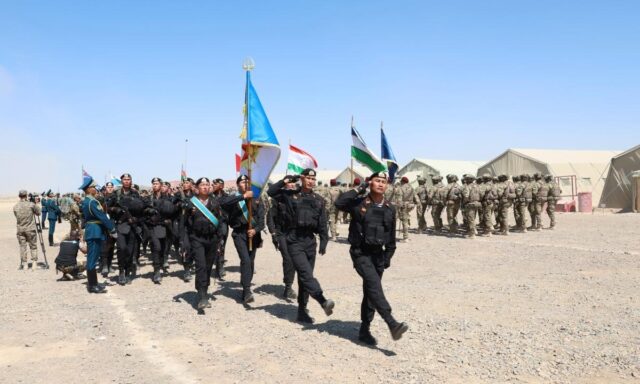
Russia’s Exclusion from Joint Caspian Drills Shows Regional Shift
By:

Executive Summary:
- Russia’s influence in the Caspian Sea littoral has declined since 2020 due to Moscow’s war against Ukraine diminishing Russian resources and international standing, regional conflicts and reordering, and the growing navies of Azerbaijan, Kazakhstan, and Iran.
- Türkiye has been instrumental in helping Azerbaijan and Kazakhstan modernize their navies, including shipbuilding partnerships and joint exercises, strengthening Ankara’s influence in the Caspian and South Caucasus.
- Regional states are diversifying military alliances, conducting joint military drills, and capitalizing on Russia’s declining leverage, while Russia seeks closer ties with Iran to maintain its influence in the Caspian.
On October 25, Azerbaijan participated in the Nusret-2025 Invitation Exercise, a joint military drill held in the Gulf of Soros in Türkiye. The exercise aimed to strengthen cooperation between the Turkish Naval Forces and the naval forces of friendly and allied countries, such as Azerbaijan (Ministry of Defense of Azerbaijan; News.az, October 25). This is the latest example of Azerbaijan’s partnership with Türkiye in strengthening its naval forces. The Caucasus region, particularly the Caspian littoral, is emerging as a focal point of geopolitical competition amid rising tensions between Russia and the West. The Caspian, often referred to as a “Russian lake” during the Soviet era, has presented new challenges to Russia’s regional dominance since 2022. Until the 2020s, Russia remained the most powerful naval power in the Caspian Sea, despite Kazakhstan, Azerbaijan, and Iran systematically enhancing their naval capabilities over the past three decades (see Strategic Snapshot, August 24).
Russia’s full-scale invasion of Ukraine in 2022, as well as regional conflicts and reordering, have exacerbated Moscow’s declining leverage and hegemony in the South Caucasus and Central Asia (see EDM, July 31, September 19, November 6, 2023, May 16, 2024, February 6, March 19). The dissolution of Nagorno-Karabakh as an ethnic Armenian enclave inside of Azerbaijan has shifted political dynamics within the three states of the South Caucasus, their mutual relations, and the regional balance of power. Azerbaijan’s 2020 and 2023 military victories in Nagorno-Karabakh, with the staunch support of Türkiye, strengthened Baku’s position as a regional “middle power.” The conflicts further cemented Azerbaijan’s alliance with Türkiye, enabling Ankara to exert more influence in the region and beyond (see EDM, October 11, 2023, September 22, October 27).
Türkiye has helped Azerbaijan and Kazakhstan modernize their naval capabilities. This naval cooperation includes a May 8 delegation of Turkish naval representatives in Azerbaijan, which toured key Azerbaijani Navy facilities, including warships and naval training centers (Caliber.az, May 8). Azerbaijan and Kazakhstan actively seek modernization and strengthening of their navy in the Caspian Sea through close partnerships with Türkiye, which has facilitated countries’ naval forces’ diverse fleet, including frigates, corvettes, submarines, and amphibious vessels, showcasing their technological advancements and projecting maritime power (Central Asia-Caucasus Analyst, October 8).
Kazakhstan has adopted a new approach to its stance on the Caspian Sea since 2023, with a focus on building coastal defense lines and modernizing its fleet for military and search-and-rescue purposes. In 2023, Türkiye’s Asfar and YDA Group, together with Kazakhstan’s Uralsk Plant “Zenit” JSC, agreed to produce naval vessels, including main surface combat ships, for Kazakhstan’s Navy (Defence Turk, July 26, 2023). This agreement sidelines Moscow’s efforts to remain the dominant actor in Kazakhstan’s shipbuilding factory—an important field that Moscow has long sought to control through a 2010 accord with Astana (Kursiv, May 28, 2010). It was reported in August that Kazakhstan drafted a comprehensive agreement with Türkiye covering shipbuilding, workforce training, and environmental safety (Sputnik Kazakhstan; KazTAG, August 12).
The Caucasus, Central Asia, and Türkiye have significantly deepened military partnerships with each other in the last three years. Baku and Astana conducted joint naval drills, Khazri-2025, on June 14 in the Kazakh section of the sea (Ministry of Defense of Azerbaijan, June 14). Azerbaijan, as the key transit country between Türkiye and Central Asia, has intensified its outreach to the Turkish Navy and the navies of other Turkic states by regularly participating in joint drills (News.az, October 25). The first joint military exercise on the Caspian Sea without Russian involvement took place in 2024, when the armed forces of Azerbaijan, Kazakhstan, Uzbekistan, Tajikistan, and Kyrgyzstan conducted the Birlestik (Unity) exercise at Kazakhstan’s Oymasha training ground and Cape Tokmak (Ministry of Defense of Kazakhstan, July 17, 2024; Times of Central Asia, July 24).
Joint military drills in the Caspian Sea, conducted without Russian participation, illustrate the changing regional power balance. Russia now faces challenges to its long-standing dominance in the basin, as Türkiye’s influence in the South Caucasus and the Caspian grows. These shifting alliances are pushing Russia toward a closer partnership with Iran. In July, Moscow and Tehran conducted joint naval drills in the Caspian Sea to assert their military presence in the region (Caspian News, July 22). The Caspian littoral states are keen to capitalize on Russia’s declining influence in the Eurasian region, as Moscow’s strategic failures in Ukraine and its confrontation with the West enable regional states to strengthen their boundaries and diversify their partnerships in military and security matters.



